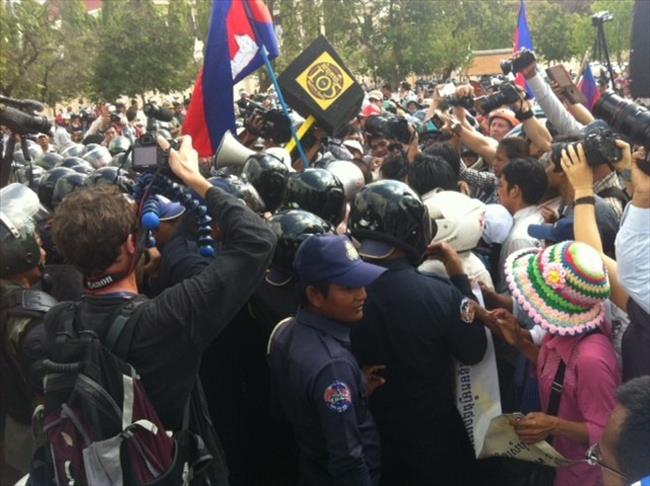
By Kate Bartlett
PHNOM PENH
Over eight months of political deadlock look set to continue, after Cambodia’s opposition leader Sam Rainsy announced Thursday that his party and the government had failed to reach a deal regarding last year’s disputed national elections.
Rainsy’s Cambodia National Rescue Party (CNRP) and the ruling Cambodian People’s Party (CPP), led by strongman Prime Minister Hun Sen, have been locked in a stalemate since July’s vote, which the CPP won by its smallest margin in years, taking 68 seats to the opposition’s 55.
The CNRP claimed to have won the vote and alleged widespread fraud. For the past 8 months they have refused to take up their seats in the country’s parliament and have been calling for a re-vote as well as the reform of Cambodia’s National Election Committee.
“At this point in time, there is no agreement yet – no comprehensive agreement yet,” Rainsy told reporters at a press conference in the capital Thursday.
“But we have moved forward. We have agreed on several points, important points,” he added.
For days, there has been speculation that following months of on-again, off-again negotiations the two parties had reached a compromise and the CNRP would take their seats as early as after next week's Khmer New Year holiday. Both Rainsy and Hun Sen had alluded to such a deal being reached in comments to local media this week.
However, Rainsy said Thursday that there was still one “stumbling block,” the fact that the CNRP want an early election but the CPP refuse to hold another vote before that scheduled for 2018.
“There is one remaining point. I think that the remaining point will be resolved in the near future. It is a matter of days or at most weeks. So I remain cautiously optimistic,” Rainsy said.
“[The point of disagreement] is the date for the re-election,” he explained, adding that the CNRP, who had originally called for mid-term elections, now wanted to see the ballot held by 2017 at the latest.
The opposition had been holding regular mass protests since the vote, until their supporters - hundreds of whom had camped out for weeks in a central park in the capital, known as Freedom Park - were violently dispersed by police armed with batons and tear-gas in January.
Since the political tension began, opposition leaders and trade unionists—who have ties to the CNRP—have been repeatedly threatened with legal action on trumped-up charges, and Phnom Penh has at times resembled a police state with large numbers of riot officers on the streets as well as road blocks and barbed-wire barricades.
In January, the government placed a ban on gatherings of more than 10 people - which critics and civil society representatives say violates the right to freedom of assembly enshrined in the Cambodian constitution.
Seven people have been killed since the election—two of them bystanders at CNRP protests when police opened fire with live rounds, and five of them garment workers attending a protest calling for a higher minimum wage—one of the key points on the opposition’s election platform back in July.
Hun Sen, one of the world’s longest ruling leaders, was a former Khmer Rouge cadre who defected in the late seventies and returned to liberate Cambodia alongside the Vietnamese army.
Many poor Cambodians credit him with having freed Cambodia from under the yoke of the ultra-Marxist regime that saw 1.7 million Cambodians murdered or die from overwork and starvation. His 29 years of rule have seen peace and development, but also massive corruption and a slew of human rights abuses.
His long-time bitter rival, Rainsy, returned to the country last year after years of living in self-imposed exile in Paris to avoid a raft of convictions he claims were politically motivated.
Taking the helm of a newly united opposition, Rainsy and his deputy Kem Sokha began a vibrant election campaign that for the first time ever saw thousands of Cambodians, especially urban youth, taking to the streets calling for change.
englishnews@aa.com.tr


